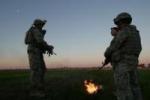An excellent article just appeared at Stinkyjournalism.org entitled Rebutting Jared Diamond's Savage Portrait: What tribal societies can tell us about justice and liberty. While it is part of a larger, ongoing, argument about Jared Diamond's New Yorker article, it has some very interesting lessons for understanding how tribal societies operate.
How do tribal communities in developing countries without functioning police, judges, law courts and prisons ensure social stability? This question is of perennial interest to anyone familiar with tribal societies. It is difficult for those of us familiar with such state institutions of law enforcement to imagine how people in tribal environments create order, particularly in dense populations like that of the New Guinea Highlands which also prizes individual political autonomy. The popular image – traceable to Renaissance times, when Europeans first encountered tribal peoples – is of savages condemned to disorderly, even anarchic lives of constant violence and frequent bloodletting.







 .
.

 . In reality, I suppose that each man is of his own while influenced by his specific and individual culture, religion, family, and tribe; however, to that end, we, and that is for all of us, must and should not equate tribal to poor.
. In reality, I suppose that each man is of his own while influenced by his specific and individual culture, religion, family, and tribe; however, to that end, we, and that is for all of us, must and should not equate tribal to poor. 
Bookmarks